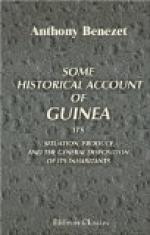[Footnote A: Bosman, page 317.]
[Footnote B: Smith, page 195.]
[Footnote C: Collect, vol. 2, p. 657.]
“There is a market held at Sabi every, fourth day,[A] also a weekly one in the province of Aplogua, which is so resorted to, that there are usually five or six thousand merchants. Their markets are so well regulated and governed, that seldom any disorder happens; each species of merchandize and merchants have a place allotted them by themselves. The buyers may haggle as much as they will, but it must be without noise or fraud. To keep order, the King appoints a judge, who, with four officers well armed, inspects the markets, hears all complaints, and, in a summary way, decides all differences; he has power to seize, and sell as slaves, all who are catched in stealing, or disturbing the peace. In these markets are to be sold men, women, children, oxen, sheep, goats, and fowls of all kinds; European cloths, linen and woollen; printed callicoes, silk, grocery ware, china, golddust, iron in bars, &c. in a word, most sorts of European goods, as well as the produce of Africa and Asia. They have other markets, resembling our fairs, once or twice a year, to which all the country repair; for they take care to order the day so in different governments, as not to interfere with each other.”
[Footnote A: Collect. vol. 3, p. 11.]
With respect to government, William Smith says,[A] “That the Gold Coast and Slave Coast are divided into different districts, some of which are governed by their Chiefs, or Kings; the others, being more of the nature of a commonwealth are governed by some of the principal men, called Caboceros, who, Bosman says, are properly denominated civil fathers, whose province is to take care of the welfare of the city or village, and to appease tumults.” But this order of government has been much broken since the coming of the Europeans. Both Bosman and Barbot mention murther and adultery to be severely punished on the Coast, frequently by death; and robbery by a fine proportionable to the goods stolen.
[Footnote A: Smith, page 193.]
The income of some of the Kings is large, Bosman says, “That the King of Whidah’s revenues and duties on things bought and sold are considerable; he having the tithe of all things sold in the market, or imported in the country."[A] Both the abovementioned authors say, The tax on slaves shipped off in this King’s dominions, in some years, amounts to near twenty thousand pounds.
[Footnote A: Bosman, page 337. Barbot, page 335.]
Bosman tells us, “The Whidah Negroes have a faint idea of a true God, ascribing to him the attributes of almighty power and omnipresence; but God, they say, is too high to condescend to think of mankind; wherefore he commits the government of the world to those inferior deities which they worship.” Some authors say, the wisest of these Negroes are sensible of their mistake in this opinion, but dare




